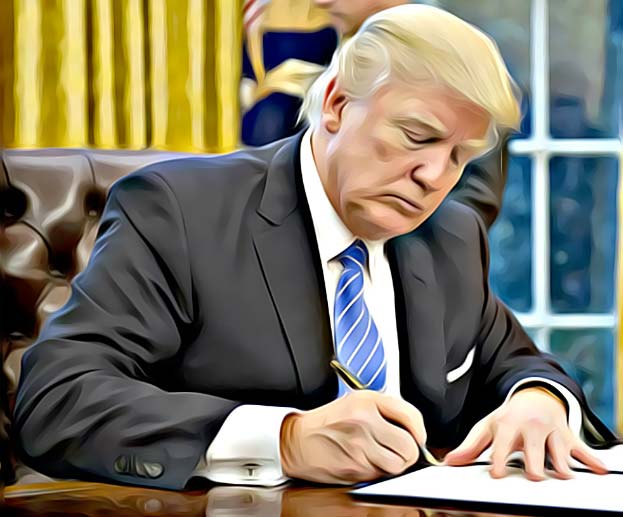
White House and Pentagon officials have been working out the details for days, said the officials, speaking on the condition of anonymity due to the sensitivity of the issue. The details were not all clear, but the move is expected to involve executive clemency, in which Trump can pardon someone or shorten a prison sentence through commutation.
The actions have been anticipated by U.S. officials and advocates for the service members for weeks, and decried by some military justice experts for what they see as a subversion of the legal process. But those experts also acknowledge that, as commander in chief, Trump has broad authority in the cases to act as he sees fit.
Trump could announce his decision by tweet or while speaking at a campaign rally in Louisiana on Thursday night, the officials said. He also could wait or announce decisions on individual cases, they said, depending on how he decides to publicize his decisions.
A Pentagon official, asked about the case, referred comment to recent remarks made by Defense Secretary Mark Esper, who acknowledged last week speaking with the president about the issue; he declined to share his personal opinion.
"I do have full confidence in the military justice system and we'll let things play out as they play out," Esper said. "I offered ― as I do in all matters ― the facts, the options, my advice, the recommendations and we'll see how things play out."
The cases include that of Army Maj. Mathew Golsteyn, a former Special Forces officer who faces a murder trial in the 2010 death of a suspected Taliban bomb maker; former Special Warfare Operator Chief Edward Gallagher, a Navy SEAL who recently was acquitted of murder but convicted of posing with an Islamic State corpse; and former Army 1st Lt. Clint Lorance, who was convicted of second-degree murder in 2013 and is serving a 19-year prison sentence for ordering his soldiers to open fire on three men in Afghanistan.
Golsteyn faces a court-martial that is scheduled for February. He first came under investigation in 2011 after he applied for a job with the CIA and disclosed during a polygraph test that he had killed someone on deployment and burned the body, according to Army documents and a Washington Post interview with Golsteyn in February.
Golsteyn said he killed the suspected bomb maker in an ambush after he had been detained and crossed paths on base with a tribal elder working with U.S. forces. U.S. troops were required to set the detainee free, he said, prompting fears that he would kill the elder. Golsteyn contends the ambush of the man, who was unarmed at the time, was legal.
Gallagher was tried by the Navy in a case over the summer that fell apart after another SEAL in his unit testified in court that he had actually killed a wounded Islamic State detainee in Iraq at the center of the case. Gallagher was convicted instead of taking a photograph with an Islamic State corpse and demoted one rank to petty officer first class. He has sought his old rank reinstated as he retires, said his attorney, Tim Parlatore.
Lorance was convicted of second-degree murder in 2013 after nine members of his unit testified against him, and has been imprisoned for the past six years at Fort Leavenworth in Kansas. Lorance's supporters have argued that Army prosecutors in his case hid details, including that biometrics showed the men were affiliated with the Taliban. The U.S. Army Court of Criminal Appeals found in 2017 that the information would not have been permitted at a new trial.
Trump has raised questions about the prosecution of the Golsteyn and Gallagher cases previously, and all three service members have received extensive media coverage, especially in the conservative media.
In October, Trump tweeted that the case of Golsteyn was "under review" at the White House. Golsteyn, who earned a Silver Star for valor in Afghanistan that was later revoked by the Army, is "a highly decorated Green Beret who is being tried for killing a Taliban bombmaker," Trump said.
"We train our boys to be killing machines, then prosecute them when they kill!" he tweeted.
In March, Trump ordered the Navy to remove Gallagher from pretrial confinement in prison, and celebrated when he was acquitted of murder in July.
"Congratulations to Navy Seal Eddie Gallagher, his wonderful wife Andrea, and his entire family," Trump tweeted. "You have been through much together. Glad I could help!"
Trump also directed the Navy to rescind Navy Achievement Medals that Navy prosecutors received in the Gallagher prosecution, tweeting that "not only did they lose the case," they had offered immunity to Gallagher's fellow SEALs in "totally incompetent fashion."
The action follows Trump pardoning another veteran, former 1st Lt. Michael Behenna, in May in the 2008 murder of an Iraqi prisoner suspected of being a member of al-Qaida.
Behenna was convicted of unpremeditated murder and sentenced to 25 years after stripping a detainee naked, interrogating him without authorization and shooting him twice. Behenna said that he was acting in self-defense and that the detainee made a move for the officer's pistol.
Sign up for the daily JWR update. It's free. Just click here.


 Contact The Editor
Contact The Editor
 Articles By This Author
Articles By This Author